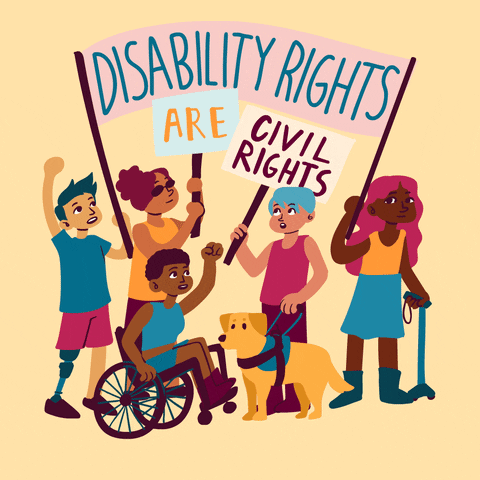"Am I asking too much? Will my manager treat me differently?"

If you're a person living with physical disabilities or neurodiverse conditions, it can be intimidating to ask your manager for workplace accommodations.
Know that you have the right to ask, and most employers have a duty to provide you with reasonable accommodations under the Americans With Disabilities Act (ADA).
Do you know what to ask for? And how to ask for it?
Did you know?
What Are Reasonable Accommodations?

Reasonable accommodations are modifications or adjustments to a job and/or the work environment that:
enable qualified people with disabilities to get a job and successfully perform its essential tasks to the same extent as people without disabilities
make it possible for employees with disabilities to enjoy equal benefits and privileges of employment
Reasonable accommodations shouldn't be viewed as special treatment. They benefit all employees by leveling the workplace playing field.
There's a good chance your HR department already has some available accommodations.
What Accommodations Might Be Available To You?
Physical Changes
Ensuring workplaces are accessible for people with personal mobility devices
Installing ramps and elevators, modifying restrooms, or changing the layout of a workspace
Accessible And Assistive Technologies
Enabling screen readers and magnification tools on work devices
Closed captioning for video meetings or voice relay services for deaf or hard of hearing employees
Accessible Communications
Providing sign language interpreters at meetings and events
Making materials available in Braille or large print
Policy enhancements
Adjusting work schedules so employees with medical conditions can go to medical appointments and complete their work at alternate times or locations
Travel Accommodations
Arranging mobility assistance when traveling to/from client sites
Making sure work-related travel opportunities aren't taken away because of physical disabilities
Learning Assistance
Specialized tutoring and/or additional time for work-related credential exams
Providing notes and/or slide decks ahead of and after meetings to support people with learning disabilities or ADHD
How Do You Ask For Reasonable Accommodations?
Whether you're in the application process or a long-serving employee, you can request accommodations whenever you need to reduce or eliminate a barrier to your job that's caused by a disability or condition.
To ask for accommodations:
Approach your employer or HR department and ask for a meeting.
At the meeting, explain that you have a condition that's preventing you from successfully completing your work duties.
Explain that your employer will need to provide extra support to help you manage your job tasks.
Things to know before you ask:
You need to disclose your disability or condition. Otherwise, your employer isn't required to provide accommodations.
Make sure you have appropriate documentation like diagnosis reports or doctor's notes ready if they ask for proof.
You might be required to fill out a request form.
While you don't have to make an initial request in writing, it's good to follow up any verbal requests with a letter or email so that you have a paper trail in case any issues arise.
Quiz
You have ADHD and you want to approach your manager to tell them that it's affecting your job. What should you do at the meeting?
Did you know?
Subscribe for more quick bites of learning delivered to your inbox.
Unsubscribe anytime. No spam. 🙂
What If You Encounter Resistance?
Some employers might not be receptive to reasonable accommodations:
They might argue that your request could cause them "undue hardship" like unreasonable expenses or unrealistic changes to the job or work environment.
They might take a long time to respond to your request or delay appropriate support.
Things to know before you ask:
If your employer can't fulfill your specific request, they can negotiate alternatives with you, so long as those alternatives are able to meet your needs on the job.
There's no specific timeframe required for the employer to provide your accommodation, as long as they respond to your request to the best of their abilities on a reasonable timeline.
If your employer denies your request, and you feel that their reason isn't sufficient, you can file for a workplace discrimination charge with the appropriate authorities.
Quiz
You have chronic back pain because of an injury that isn't work related. A recent flare-up is interfering with your office job. Which accommodations can you negotiate with your employer?
Did you know?
Take Action

Approaching your manager with a clear plan will help you get the support you need so that you can work as comfortably and productively as any employee.
To request accommodations:
Your feedback matters to us.
This Byte helped me better understand the topic.